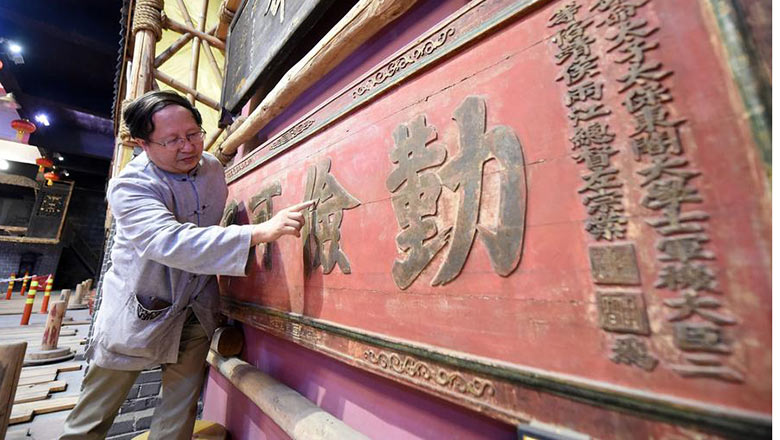China adds per capita income into growth target
Updated: 2012-11-08 16:13
(Xinhua)
|
||||||||
BEIJING - Chinese leader Hu Jintao set a new target for economic growth on Thursday, saying that the country should double its 2010 GDP and per capita income by 2020.
"On the basis of making China's development much more balanced, coordinated and sustainable, we should double its 2010 GDP and per capita income for both urban and rural residents (by 2020)," Hu said in a keynote speech at the opening of the 18th National Congress of the Communist Party of China (CPC).
This is the first time that per capita income has been included in the country's 2020 blueprint for a moderately prosperous society. Previous targets set at the 16th and 17th CPC national congresses merely called for the growth of GDP, not of per capita income.
SOLEMN PROMISE
An internationally accepted indicator for gauging people's living standards, per capita income refers to the earnings of each person if the national income were to be equitably divided between the country's 1.3 billion people.
Chang Xiuze, an economist with the National Development and Reform Commission, the country's economic planner, sees the quantitative target as a solemn promise made by the Party as well as a manifestation of the Party's resolve to address public concerns and facilitate economic growth for the good of the people.
Official statistics showed that China's fiscal revenues broke the 10-trillion-yuan benchmark last year, registering growth of 24.8 percent from 2010.
Also in 2011, the per capita disposal income for Chinese urban dwellers rose by 14.1 percent to 21,810 yuan (3,493 U.S. dollars) over that in 2010. The figure for rural residents rose by 17.9 percent to 6,977 yuan. The figures could be lower with consideration of inflation.
In 2007, the world's average income per person stood at 7,000 U.S. dollars, according to the Globalist Quiz produced by the Globalist, an online magazine that focuses on globalization.
As China's economic take-off has been largely propelled by cheap labor in past decades, Chinese workers have remained at a disadvantage in terms of income distribution.
With more wealth in the treasury, the government can build up public infrastructure and improve public services, while financially capable corporations can expand their production and boost the economy, experts say.
Hu made it clear Thursday morning that China must deepen income distribution reforms and increase individual incomes in step with economic development.
"We should raise the share of individual income in the distribution of national income and increase the share of work remuneration in primary distribution," Hu said.
An overall income distribution reform plan is expected to be released at the end of the year.
Delegate Liu Ke took the target as a signal that the people's wellbeing will occupy a more prominent position in China's future reforms.
"It is in line with the requirements of scientific development, the essential target of which is to benefit the people," he said.
To realize the target, Hu said China will strive to increase contributions made through scientific and technological progress to economic growth and turn China into an innovative country.
Under the Party's blueprint, China should basically accomplish industrialization, significantly expand IT application and markedly improve the quality of urbanization by 2020.
Notable progress should also be made in modernizing agriculture, and a basic mechanism for promoting balanced development between regions should be in place, Hu said.
The biggest challenge facing the target, delegate Song Changrui said, will be downward pressure in the Chinese economy.
"For the wellbeing of all, Chinese people should unite and double their efforts to advance economic restructuring for a sustainable future," he said.
SOCIAL JUSTICE AND FAIRNESS
Delegate Lin Duo said social justice and fairness would be a welcome byproduct of economic reforms.
"If the fruits of China's economic reform and opening up can benefit all Chinese equally, both overall living standards and social harmony will improve," he said.
According to Hu, the upcoming reforms will strike a balance between efficiency and fairness in both primary and secondary distribution, with particular emphasis on fairness in secondary distribution.
China should improve the primary distribution system to allow factors of production such as labor, capital, technology and managerial expertise to have their due share of income according to their respective contributions, and China should take swift action to improve the mechanism for adjusting secondary distribution through taxation, social security and transfer payments, he said.
Reforms for the wage and salary system in enterprises, government bodies and public institutions will be deepened and collective bargaining for wages in enterprises will be promoted, Hu said.
He said said the Party will protect income earned through work and increase proprietary individual income through multiple channels.
"We should improve the way in which income is distributed, protect lawful income, increase the income of low-income groups, adjust excessively high income, and prohibit illicit income," he said.
Ungad Chadda, senior vice president of the Toronto Stock Exchange, a world leader in mining and energy financing, is closely watching the congress in order to better understand China's future growth prospects.
He said he has been looking at elements related to the emerging middle class, increasing migration into urban centers and an increased appetite for goods, all of which are critical to the market.
William Ratliff, a fellow at Stanford University's Hoover Institution and the Independent Institute, said one of the biggest challenges facing the government and the CPC will be figuring out how to steadily improve governance, the economy and living conditions in a rapidly changing world by balancing development.
Hu urged all Party members to use greater political courage and vision and discard any notions that could hinder efforts to pursue development in a scientific way.
"As long as we remain true to our ideals and firm in our conviction, never vacillate in our efforts or act recklessly, we will surely meet the goal," he said.
- Russia to build first cruise liner in 60 years
- LinkedIn, Airbnb match refugees with jobs, disaster survivors with rooms
- Duterte 'willing to improve ties' with Beijing
- Canadian PM to introduce transgender rights bill
- Hillary Clinton says her husband not to serve in her cabinet
- New York cake show designs fool your eyes

 China Daily, celebrating 35 years
China Daily, celebrating 35 years
 Six things you may not know about Grain Buds
Six things you may not know about Grain Buds
 China Beijing International High-tech Expo
China Beijing International High-tech Expo
 Highlights at Google I/O developers conference
Highlights at Google I/O developers conference
 Nation celebrates International Museum Day
Nation celebrates International Museum Day
 Body brushwork creates vivid animals
Body brushwork creates vivid animals
 Can you still recognize these cities?
Can you still recognize these cities?
 A private museum owner's devotion to cultural protection
A private museum owner's devotion to cultural protection
Most Viewed
Editor's Picks

|

|

|

|

|

|
Today's Top News
Liang avoids jail in shooting death
China's finance minister addresses ratings downgrade
Duke alumni visit Chinese Embassy
Marriott unlikely to top Anbang offer for Starwood: Observers
Chinese biopharma debuts on Nasdaq
What ends Jeb Bush's White House hopes
Investigation for Nicolas's campaign
Will US-ASEAN meeting be good for region?
US Weekly

|

|







